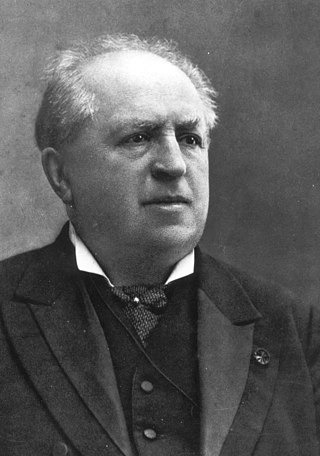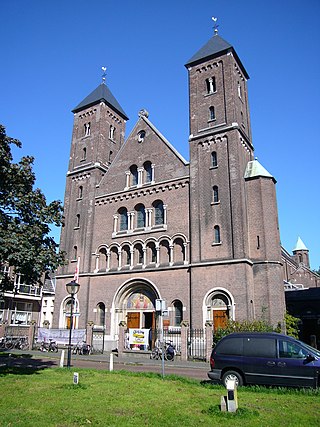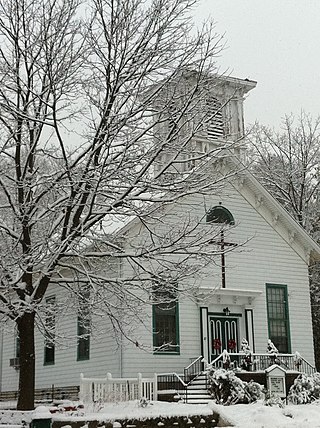The terms Old Catholic Church, Old Catholics, Old-Catholic churches, or Old Catholic movement, designate "any of the groups of Western Christians who believe themselves to maintain in complete loyalty the doctrine and traditions of the undivided church but who separated from the see of Rome after the First Vatican council of 1869–70". The expression Old Catholic has been used from the 1850s by communions separated from the Roman Catholic Church over certain doctrines, primarily concerned with papal authority and infallibility. Some of these groups, especially in the Netherlands, had already existed long before the term. The Old Catholic Church is separate and distinct from Traditionalist Catholicism.

Pope Adrian VI, born Adriaan Florensz Boeyens, was head of the Catholic Church and ruler of the Papal States from 9 January 1522 until his death on 14 September 1523. The only Dutchman to become pope, he was the last non-Italian pope until the Polish John Paul II 455 years later.

Ultramontanism is a clerical political conception within the Catholic Church that places strong emphasis on the prerogatives and powers of the Pope. It contrasts with Gallicanism, the belief that popular civil authority—often represented by the monarch's or state's authority—over the Church is comparable to that of the Pope.
Presbyterianpolity is a method of church governance typified by the rule of assemblies of presbyters, or elders. Each local church is governed by a body of elected elders usually called the session or consistory, though other terms, such as church board, may apply. Groups of local churches are governed by a higher assembly of elders known as the presbytery or classis; presbyteries can be grouped into a synod, and presbyteries and synods nationwide often join together in a general assembly. Responsibility for conduct of church services is reserved to an ordained minister or pastor known as a teaching elder, or a minister of the word and sacrament.

Continental Reformed Protestantism is a part of the Calvinist tradition within Protestantism that traces its origin in the European continent. Prominent subgroups are the Dutch Reformed, the Swiss Reformed, the French Reformed (Huguenots), the Hungarian Reformed, and the Waldensian Church in Italy.

The Reformed Church in America (RCA) is a mainline Reformed Protestant denomination in Canada and the United States. It has about 84,957 members. From its beginning in 1628 until 1819, it was the North American branch of the Dutch Reformed Church.

Abraham Kuyper was the Prime Minister of the Netherlands between 1901 and 1905, an influential neo-Calvinist pastor and a journalist. He established the Reformed Churches in the Netherlands, which upon its foundation became the second largest Reformed denomination in the country behind the state-supported Dutch Reformed Church.

Reformed Baptists, Particular Baptists and Calvinistic Baptists, are Baptists that hold to a Calvinist soteriology. Depending on the denomination, Calvinistic Baptists adhere to varying degrees of Reformed theology, ranging from simply embracing the Five Points of Calvinism, to accepting a modified form of federalism; all Calvinistic Baptists reject the classical Reformed teaching on infant baptism as a sign and seal of the covenant of grace. The first Calvinistic Baptist church was formed in the 1630s. The 1689 Baptist Confession of Faith is a significant summary of the beliefs of Reformed Baptists. The name "Reformed Baptist" dates from the latter part of the 20th century to denote Baptists who retained Baptist ecclesiology, and reaffirmed more historic Baptist biblical theology, such as Covenant theology.

The Christian Reformed Church in North America is a Protestant Calvinist Christian denomination in the United States and Canada. Having roots in the Dutch Reformed Church of the Netherlands, the Christian Reformed Church was founded by Dutch immigrants in 1857 and is theologically Calvinist.

The Polish National Catholic Church is an independent Old Catholic church based in the United States and founded by Polish-Americans.

Bernardus Johannes Alfrink was a Dutch Cardinal of the Roman Catholic Church. He served as Archbishop of Utrecht from 1955 to 1975, and was elevated to the cardinalate in 1960.

The Prussian Union of Churches was a major Protestant church body which emerged in 1817 from a series of decrees by Frederick William III of Prussia that united both Lutheran and Reformed denominations in Prussia. Although not the first of its kind, the Prussian Union was the first to occur in a major German state.

Middlebush Reformed Church, known as "the church with the red doors", is located at 1 South Middlebush Road at the corner of Amwell Road in the Middlebush section of Franklin Township in Somerset County, New Jersey, United States. It is the fourth oldest church in Franklin Township. It was organized in 1834, and the New York Times noted their first church was built in Colonial times and was one of the landmarks of the region. The church is a contributing property of the Middlebush Village Historic District that was added to the National Register of Historic Places on April 24, 2007.

The Union of Utrecht of the Old Catholic Churches, most commonly referred to by the short form Union of Utrecht, is a federation of Old Catholic Churches, nationally organized from schisms which rejected Roman Catholic doctrines of the First Vatican Council in 1870; its member churches are not in communion with the Roman Catholic Church.
In Lutheranism, the Eucharist refers to the liturgical commemoration of the Last Supper. Lutherans believe in the real presence of Christ in the Eucharist, affirming the doctrine of sacramental union, "in which the body and blood of Christ are truly and substantially present, offered, and received with the bread and wine."

The Monsey Church is the colloquial name of a historic Reformed Christian church in the hamlet of Monsey, town of Ramapo, in southern Rockland County, New York, the official name of which, since December 6, 2000, is New Hope Christian Church. The church was founded in 1824 as the True Reformed Dutch Church of West New Hempstead and later became known as the Monsey Christian Reformed Church. The church owns a historic cemetery adjacent to the site of its first meeting house and briefly operated a private Christian school in the 1950s and '60s. Today the church is a member congregation of the Presbyterian Church in America (PCA). It is the only remaining church that was once part of the True Reformed Dutch Church.

The Protestant Reformed Church of Alsace and Lorraine is a Calvinist denomination in Alsace and northeastern Lorraine, France. As a church body, it enjoys the status as an établissement public du culte.

The Protestant Church of the Augsburg Confession of Alsace and Lorraine is a Lutheran church of public-law corporation status in France. The ambit of the EPCAAL comprises congregations in Alsace and the Lorrain Moselle department.

The Genevan Consistory is a council of the Protestant Church of Geneva similar to a synod in other Reformed churches. The Consistory was organized by John Calvin upon his return to Geneva in 1541 in order to integrate civic life and the church.

In Protestant usage, a consistory designates certain ruling bodies in various churches. The meaning and the scope of functions varies strongly, also along the separating lines of the Protestant denominations and church bodies.















